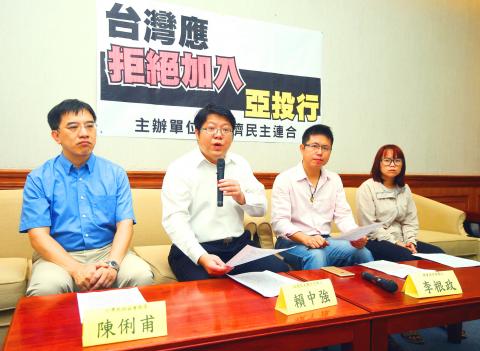Green Party Taiwan and the Economic Democracy Union yesterday voiced objections to Taiwan joining the Beijing-led Asian Infrastructure Investment Bank (AIIB), a topic expected to be covered at a meeting between Mainland Affairs Council Minister Andrew Hsia (夏立言) and China’s Taiwan Affairs Office Minister Zhang Zhijun (張志軍) today in Kinmen County.
Green Party Taiwan co-convener Lee Ken-cheng (李根政) told a press conference in Taipei that the party is against the nation’s bid to become a member of the AIIB if the application process is opaque or subordinates Taiwan’s sovereignty.
Lee said that the Ministry of Finance’s submission of an application in late March to become a founding member of the bank had fueled controversy in Taiwan, with critics saying the authorities had failed to follow proper procedures and had compromised the nation’s sovereignty.

Photo: Wang Min-wei, Taipei Times
Beijing rejected Taiwan’s application, saying it would only grant Taiwan a seat on the AIIB’s board of founding members if the nation agrees to its “one China” policy.
Lee said that the AIIB is China’s strategy to boost its global influence by lending capital to developing countries for basic infrastructure and to appeal to European countries that are struggling financially.
In doing so, China would have an outlet for its surplus cash and undermine the US dollar, Lee said, adding that he doubted developing countries’ opinions would weigh much in the AIIB.
Economic Democracy Union convener Lai Chung-chiang (賴中強) said that Taiwan should not be part of an organization aimed at boosting Chinese political and economic influence.
China also has an atrocious track record of damaging the environment and ignoring human rights while building its own infrastructure, he said.
As China claims Taiwan as its territory, Taiwan should not pander to the strategic development goals of a country that harbors such aggression, Lai said.
President Ma Ying-jeou’s (馬英九) administration should not misappropriate the nation’s reserve funds or other money to invest in the AIIB, Lai said, adding that the union would lobby legislators to block proposals for the organization.
In related news, Democratic Progressive Party Legislator Tuan Yi-kang (段宜康) on Thursday posted on Facebook a screenshot of records of a conversation on the Line app, which he said shows that the government is mobilizing people to welcome Zhang’s visit to Kinmen.
“We are looking for some people to give him a warm welcome. The wage for one-and-a-half days from 1pm to 6pm on May 23 and 8am to 6pm on May 24 is NT$1,500. Everyone can get a T-shirt, a lunch box and drinks. Transportation is also available,” the message read.
The sender of the message said the job is to form a crowd around activities that Zhang would participate in when he is in Kinmen, including meetings with Hsia, Kinmen County Commissioner Chen Fu-hai (陳福海) and local business leaders, as well as visits to a reservoir and some local manufacturers.
“Some people are organizing a cheering squad to flatter Zhang,” Tuan said. “Is this sort of pomp and circumstance necessary to welcome Chinese officials?
“If they really think that they are warmly welcomed, they might misjudge the situation and have some misconceptions,” he said.
The Mainland Affairs Council did not comment on the allegations.
Additional reporting by Shih Hsiu-chuan, Tseng Wei-chen and Peng Hsien-chun

Chinese Nationalist Party (KMT) Chairman Eric Chu (朱立倫), spokeswoman Yang Chih-yu (楊智伃) and Legislator Hsieh Lung-chieh (謝龍介) would be summoned by police for questioning for leading an illegal assembly on Thursday evening last week, Minister of the Interior Liu Shyh-fang (劉世芳) said today. The three KMT officials led an assembly outside the Taipei City Prosecutors’ Office, a restricted area where public assembly is not allowed, protesting the questioning of several KMT staff and searches of KMT headquarters and offices in a recall petition forgery case. Chu, Yang and Hsieh are all suspected of contravening the Assembly and Parade Act (集會遊行法) by holding

PRAISE: Japanese visitor Takashi Kubota said the Taiwanese temple architecture images showcased in the AI Art Gallery were the most impressive displays he saw Taiwan does not have an official pavilion at the World Expo in Osaka, Japan, because of its diplomatic predicament, but the government-backed Tech World pavilion is drawing interest with its unique recreations of works by Taiwanese artists. The pavilion features an artificial intelligence (AI)-based art gallery showcasing works of famous Taiwanese artists from the Japanese colonial period using innovative technologies. Among its main simulated displays are Eastern gouache paintings by Chen Chin (陳進), Lin Yu-shan (林玉山) and Kuo Hsueh-hu (郭雪湖), who were the three young Taiwanese painters selected for the East Asian Painting exhibition in 1927. Gouache is a water-based

Taiwan would welcome the return of Honduras as a diplomatic ally if its next president decides to make such a move, Minister of Foreign Affairs Lin Chia-lung (林佳龍) said yesterday. “Of course, we would welcome Honduras if they want to restore diplomatic ties with Taiwan after their elections,” Lin said at a meeting of the legislature’s Foreign Affairs and National Defense Committee, when asked to comment on statements made by two of the three Honduran presidential candidates during the presidential campaign in the Central American country. Taiwan is paying close attention to the region as a whole in the wake of a

OFF-TARGET: More than 30,000 participants were expected to take part in the Games next month, but only 6,550 foreign and 19,400 Taiwanese athletes have registered Taipei city councilors yesterday blasted the organizers of next month’s World Masters Games over sudden timetable and venue changes, which they said have caused thousands of participants to back out of the international sporting event, among other organizational issues. They also cited visa delays and political interference by China as reasons many foreign athletes are requesting refunds for the event, to be held from May 17 to 30. Jointly organized by the Taipei and New Taipei City governments, the games have been rocked by numerous controversies since preparations began in 2020. Taipei City Councilor Lin Yen-feng (林延鳳) said yesterday that new measures by